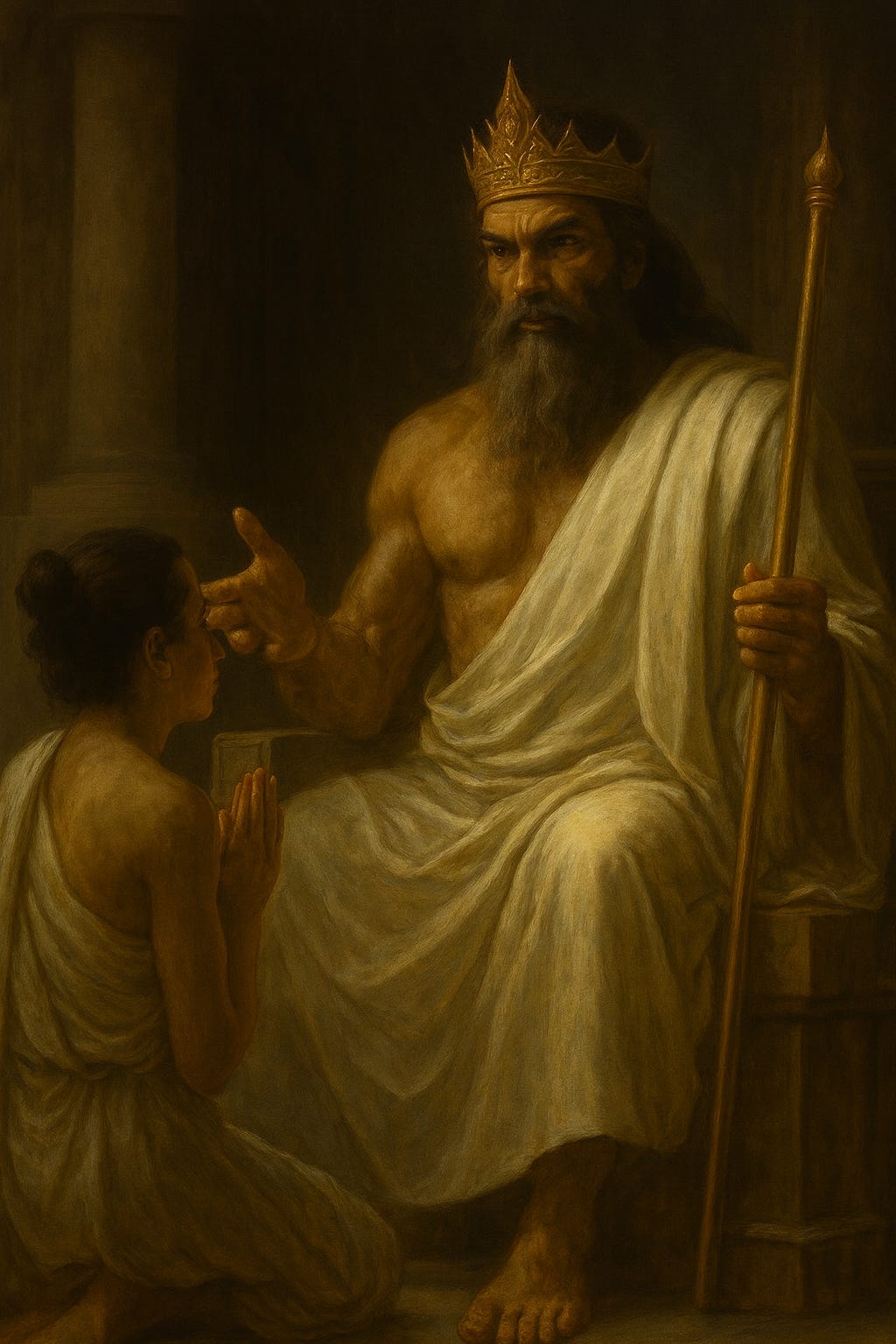Yamaraja reveals the supreme secret to Nachiketā
As the Katha Upaniṣad promises, one who studies this passage with faith and attention is glorified even in the spiritual world. A new translation revealing the spirit of the passage.
This is the continuation of the article The three boons from death: a short introduction to the Katha Upanisad, which brings the conversation of Naciketā, the brahmana boy, and Yamaraja, the Lord of death.
Nachiketā asks for detailed knowledge on the science of the soul, and Yamaraja reveals himself hesitant to reveal such confidential knowledge. Yamaraja granted the three boons, expecting he would ask for simple material blessings, but instead Nachiketā revealed himself intelligent enough to ask for the most valuable secret.
Yamaraja tried to lure Nachiketā by offering him a long life and all kinds of opulences, by the intelligent boy was not interested. Yama was thus forced to reveal to him the great secret. After receiving the instructions of Yamaraja and perfectly understanding them, Naciketā attained not only liberation, but a spiritual body, becoming an associate of the Lord in Vaikuṇṭha. In this way, the Upaniṣad teaches us the path for attaining the same perfection.
Here are the verses with the second part of the instructions. As the Upaniṣad promises, one who studies it with faith and attention is glorified even in the spiritual world.
ṛtaṁ pibantau sukṛtasya loke guhāṁ praviṣṭau parame parārdhe
chāyātapau brahma-vido vadanti pañcāgnayo ye ca tri-ṇāciketāḥ
"The knowers of Brahman, who tend the five fires and perform the threefold nāciketa sacrifice, speak of the two beings who have entered the cave of the heart, the most excellent space, for performing pious deeds and experiencing the results of karma. They describe them as like shadow and light." (Kaṭha Upaniṣad 1.3.1)
yaḥ setur ījānānām akṣaraṁ brahma yat param
abhayaṁ titīrṣatāṁ pāraṁ nāciketaṁ śakemahi
"Let us meditate upon the Supreme Lord, the imperishable Brahman, who is the support for those who perform sacrifice, the fearless shore for those desiring to cross the ocean of saṁsāra and attain the transcendental abode. This Supreme Lord is obtained by the performance of the nāciketa sacrifice."(Kaṭha Upaniṣad 1.3.2)
ātmānaṁ rathinaṁ viddhi śarīraṁ ratham eva ca,
buddhiṁ tu sārathiṁ viddhi manaḥ pragraham eva ca
"Know that the soul (ātmā) is the passenger, and that the body is the chariot. Know intelligence as the driver and the mind as the reins." (Kaṭha Upaniṣad 1.3.3)
In many passages of the Upaniṣads, ātmā means the Supreme Lord. However, in this passage, ātmā means the soul inside the body. The sequence described in the passage is senses < sense objects < mind < intelligence < the soul (ātmā, or mahat) < the subtle body (which is called avyakta because it is invisible) < the Lord (puruṣa).
indriyāṇi hayāny āhur viṣayāṁs teṣu gocarān
ātmendriya-mano-yuktaṁ bhoktety āhur manīṣiṇaḥ
"The wise say the senses are the horses, and the sense objects are the paths of the horses. They say that the soul encased by the body, senses, mind, and intelligence becomes thus the enjoyer of this world." (Kaṭha Upaniṣad 1.3.4)
The intelligence, guided by the words of the scriptures, is supposed to discipline the activities of the mind, which in turn is supposed to restrain the senses. In this way, a person can act piously and gradually advance, even while on the path of material enjoyment.
yas tv avijñānavān bhavaty ayuktena manasā sadā
tasyendriyāṇy avaśyani duṣṭāśvā iva sāratheḥ
"However, the ignorant person, who lacks true knowledge and discrimination, wanders with an uncontrolled mind and unbridled senses, like a charioteer with unruly horses." (Kaṭha Upaniṣad 1.3.5)
yas tu vijñānavān bhavati yuktena manasā sadā
tasyendriyāṇi vaśyāni sad-aśvā iva sāratheḥ
"He, on the other hand, who has knowledge along with a controlled mind, can keep his senses under control at all times, just like a skillful driver driving a chariot drawn by disciplined horses." (Kaṭha Upaniṣad 1.3.6)
yas tv avijñānavān bhavaty amanaskaḥ sadā’śuciḥ
na sa tat-padam āpnoti saṁsāraṁ cādhigacchatiyas tu vijñānavān bhavati sa-manaskaḥ sadā śuciḥ
sa tu tat-padam āpnoti yasmād bhūyo na jāyate
"He who is ignorant, remains always distracted and without self-control. Always impure, he does not attain the supreme state. Instead, he falls into the lower species and remains in the cycle of birth and death. But he who, endowed with knowledge, develops self-control and an attentive mind, remains always pure, attaining freedom. He attains the supreme destination, the place from which one has never to return." (Kaṭha Upaniṣad 1.3.7-8)
vijñāna-sārathir yas tu manaḥ pragrahavān naraḥ
so’dhvanaḥ pāram āpnoti tad viṣṇoḥ paramaṁ padam
"He who has spiritual realization as his charioteer, driving the chariot of the body with the reins of a controlled mind, crosses the ocean of birth and death and reaches the end of the journey, the supreme abode of Lord Viṣnu." (Kaṭha Upaniṣad 1.3.9)
indriyebhyaḥ parā hy arthā, arthebhyaś ca paraṁ manaḥ
manasas tu parā buddhir, buddher ātmā mahān paraḥmahataḥ param avyaktam, avyaktāt puruṣaḥ paraḥ
puruṣān na paraṁ kiñcit, sā kāṣṭhā sā parā gatiḥ
"Higher than the senses are the sense-objects; higher than the sense-objects is the mind; higher than the mind is intelligence; higher than intelligence is the soul (mahāt). Higher than mahāt is avyakta (the subtle body, which includes all previous components). Superior to avyakta is the puruṣa (the Supreme Lord, as Paramātmā). There is nothing superior to the Lord. He is the final goal." (Kaṭha Upaniṣad 1.3.10-11)
eṣa sarveṣu bhūteṣu gūḍho’tmā na prakāśate
dṛśyate tv agryayā buddhyā sūkṣmayā sūkṣma-darśibhiḥ
"This Supreme Self (the Lord) resides together with the soul in all beings, but He is hidden, not showing His radiance. However, He is seen by the wise, equipped with purified intelligence, which gives them the ability to perceive the spiritual." (Kaṭha Upaniṣad 1.3.12)
yacched vāṅ-manasī prājñas tad yacchej jñāna ātmani
jñānam ātmani mahati niyacchet tad yacchec chānta ātmani
"A wise person should control his speech, as well as all other senses, by the mind, and control the mind using the intelligence. He should then control the intelligence by the soul (mahat), who is the doer. The soul should then surrender into the Lord within (ātmani, or antaryāmī), who eliminates all material urges (śānte)." (Kaṭha Upaniṣad 1.3.13)
This verse is similar to verses 3.42-43 of the Gītā:
"The working senses are superior to dull matter; mind is higher than the senses; intelligence is still higher than the mind; and he [the soul] is even higher than the intelligence. Thus knowing oneself to be transcendental to the material senses, mind and intelligence, O mighty-armed Arjuna, one should steady the mind by deliberate spiritual intelligence [Kṛṣṇa consciousness] and thus – by spiritual strength – conquer this insatiable enemy known as lust."
uttiṣṭhata jāgrata prāpya varān nibodhata
kṣurasya dhārā niśitā duratyayā durgaṁ pathas tat kavayo vadanti
"Stand up! Wake up! Approaching the great ācāryas, learn about the Lord. Be attentive. The wise declare this path to be sharp like the edge of a razor, hard to cross, difficult to tread." (Kaṭha Upaniṣad 1.3.14)
Once a soul comes in contact with the material energy, it is easy to remain for many lives distracted by the many allurements of this material world. To finally become free, we need to become attentive to the process of self-realization. The wise ones described in the verse (kavayaḥ) are the jñanis, for whom the spiritual process is especially difficult, and one can fall for the smallest inattention. For Vaiṣnavas, the spiritual process is much easier because it is based on directly engaging the senses in the service of the Lord and acquiring a higher taste. However, just as the verse advises, we can be lost if we are not attentive to our practice, especially to the chanting of the holy names.
As Prabhupada explains: "Unless one is sufficiently protected by the Lord, he may fall down from his spiritual position; therefore one has to pray constantly to the Lord for protection and the blessing to carry out one's duty. Lord Caitanya also entrusted His missionary work to His devotees and assured them of His protection against the onslaught of material affection. The path of spiritual life is stated in the Vedas to be like the edge of a sharpened razor. A little inattentiveness may at once create havoc and bloodshed, but one who is a completely surrendered soul, always seeking protection from the Lord in the discharge of his entrusted duties, has no fear of falling into material contamination." (SB 3.9.24, Purport)
aśabdam asparśam arūpam avyayaṁ, tathā’rasaṁ nityam agandhavac ca yat
anādy anantaṁ mahataḥ paraṁ dhruvaṁ, nicāyya tan mṛtyu-mukhāt pramucyate
"Seeing the Lord, who is eternally transcendental, unchanging, free from material qualities such as sound, touch, form, taste, and smell, who is without beginning and superior to the jīva, one becomes free from birth and death."(Kaṭha Upaniṣad 1.3.15)
The soul is defined in this passage as mahat, and the Lord is mahataḥ param, superior to the individual soul. We should therefore surrender to the Lord to become free from birth and death. This is the conclusion of Yamaraja.
nāciketam upākhyānaṁ mṛtyu-proktaṁ sanātanam
uktvā śrutvā ca medhāvī brahma-loke mahīyate
"Having recited or heard this eternal story concerning the teachings of Yamaraja to Naciketā, the wise one becomes great and is glorified even in the spiritual world." (Kaṭha Upaniṣad 1.3.16)
ya imaṁ paramaṁ guhyaṁ śrāvayed brahma-saṁsadi
prayataḥ śrāddha-kāle vā tad ānantyāya kalpate
tad ānantyāya kalpata iti
Whoever recites this highest secret with purity and devotion in an assembly of brāhmanas dedicated to acquiring knowledge, or during the śrāddha ceremony, becomes eligible to infinite rewards. Indeed, such a supremely pious act leads one to immortality." (Kaṭha Upaniṣad 1.3.17)
If you read this article to the end, give it a like. This makes Substack recommend it to more people.
Read also:





